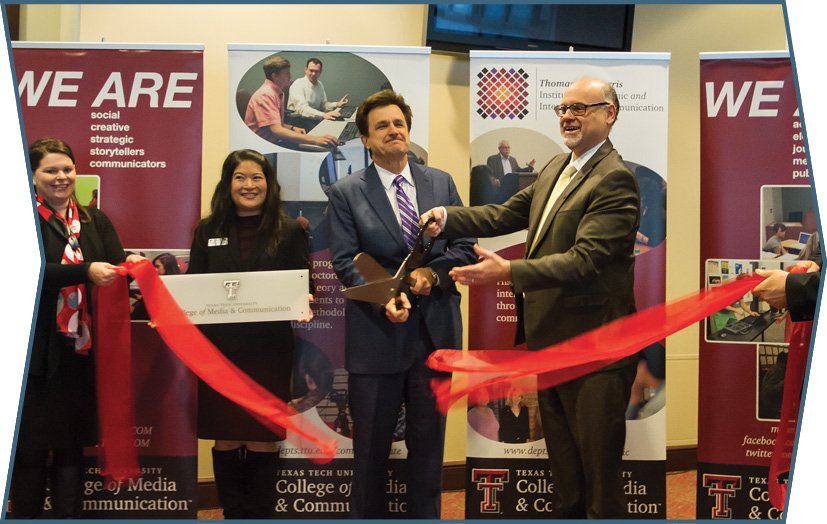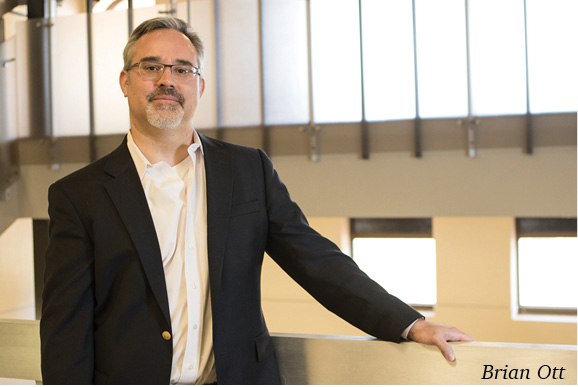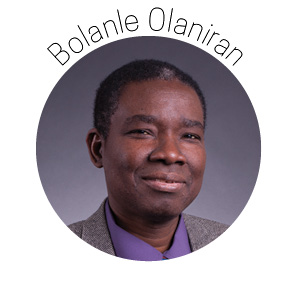College of Media & Communication
welcomes the Department of
Communication Studies

Department of
Communication Studies
now in College of Media & Communication
Beginning with the Spring 2015 semester, the Department of Communication Studies has a new home at Texas Tech University.
A ribbon-cutting ceremony was held Jan. 12 at Jones AT&T Stadium marking the department’s move from the College of Arts and Sciences to the College of Media & Communication. The move became official as of Jan. 1.
David Perlmutter, dean of the CoMC, said the move will benefit students by combining efforts and focus in communication in all areas of teaching and research.
“I think it will be better for teaching, for securing research grants, and for the vision for the future to have all the scholars, practitioners and educators together in one building but with a joint focus that will help us meet that future with a clear vision,” Perlmutter said. “In our workplace, students need to have the whole repertoire of oral, visual and written communication skills.”
The Department of Communication Studies joins the departments of Advertising, Journalism & Electronic Media, and Public Relations as the program in the College of Media & Communication. Provost and senior vice president Lawrence Schovanec echoed the sentiments of many in Media & Communication that it will help increase the college’s diversity, inclusiveness and expansiveness.
“Communication Studies is one of the original departments at Texas Tech and it is rooted in arts and sciences and the liberal arts,” Schovanec said. “But I think the leadership here has been wonderful and it will be for the better. Graduate students now are in a college where they will have access to a doctoral program. (Students) will have the benefit of faculty with a much broader range of research and scholarly expertise.”
Perlmutter said the decision to move the Department of Communication Studies has been about three or four years in the making, since a committee began studying the move. He did indicate having communication studies be part of a communications college is a trend, citing Texas State, the University of Texas and UT-Arlington.
As part of the move, adjustments in curriculum are also being made, most notably that a course in interpersonal communication will now be a required class for all Media & Communication students.
The move to Media & Communication also means eight faculty and two staff members will become part of the college, though they were already housed on the 10th floor of the Media & Communication building.
Associate Professor Narissra Punyanunt-Carter served as the department’s interim chair during the transition, and Perlmutter said after a national search, Brian Ott, Ph.D., was named as the new department chair. He also said plans are to add three to four professors, including at least two assistant professors.
“The reality today is that students graduating into the workforce are facing changes that occur very rapidly,” Perlmutter said. “They have to be versatile and adaptive. The greater the menu of ideas and theories they are exposed to, the more prepared they will be for the work environment of the future. As far as research, this will allow for much easier collaboration. We already see a lot of joint research in health communications, grant proposals and community engagement. This is a win-win for all students and for Texas Tech.”
(George Watson is a senior editor for Texas Tech Communications and Marketing. Story reprinted with permission from Texas Tech Today.)
Brian Ott, Ph.D.
The Department of Communication Studies at Texas Tech University has experienced a series of changes in 2015, transitioning from its former “home” in the College of Arts & Sciences to residing in the College of Media & Communication. And the department welcomed a new chairperson: Brian Ott, Ph.D., a professor at the University of Colorado, Denver, who transferred to Texas Tech on June 1.
Ott said that while he has held a variety of administrative positions, he has never held the position of chairperson. He explained that this new opportunity was one of the things that drew him to pursuing a career at Texas Tech.
The department’s merger with CoMC is a move Ott said he is very excited about, because his background is in the area of media studies. He also said he looks forward to sitting down with the department faculty and reviewing the current curriculum to make sure it is meeting the needs of the students.

“Communication is a rapidly changing, very dynamic field and it’s easy to fall behind,” Ott said. “I want to make sure that we have a state-of-the-art curriculum that is appealing to our students and that adequately prepares them for the jobs that are available to them at the start of the 21st century.”
Ott noted that one of his key commitments is to strengthen, enhance and build the Department of Communication Studies’ undergraduate program. He explained that he focuses on undergraduate education because he sees it as the foundation from which everything else is built. “I think the basis of the success of any department depends upon the success of its undergraduate program,” Ott said.
In addition to having a background in media production, Ott said he teaches courses such as Introduction to Media Studies, which is a survey of critical perspectives of the role of media in society, and Media and Society, which is an analysis of the historical evolution of communication technologies and the way each shift in communication technology has transformed society over time.
“My whole career has been about teaching students how to apply the skills they learn about the media industry in a way that is ethical,” Ott said. “I try to get students to think about the messages they’re creating and what role those messages will play in society.”
Ott earned a bachelor’s in communication from George Mason University in 1991 and a master’s in 1993 and a doctorate in 1997 in communication arts & sciences from The Pennsylvania State University.
(Rachel Blevins is a sophomore journalism major from Mineral Wells, Texas.)








Communication Studies
Professors
Narissra Punyanunt-Carter
Narissra Punyanunt-Carter, Ph.D., is an associate professor in the Department of Communication Studies. She earned bachelor’s and master’s degrees in communication studies from Texas Tech, and a doctorate in interpersonal and family communication from Kent State University.
Punyanunt-Carter has been an associate professor at Texas Tech for 14 years and teaches interpersonal communication, gender, nonverbal and romantic relationships. Her primary area of research is relationship communication and interpersonal communication, and her secondary area is studying the effects of media. Punyanunt-Carter researches topics including romantic relationships, computer-mediated communication, father-daughter communication, and mass media portrayals of romance.
Punyanunt-Carter said she is very excited about the Department of Communication Studies merging with the CoMC because her background is in both media studies and interpersonal communication. After researching how both areas overlap, she said the merger just makes sense.
Katie Langford
Katie Langford, Ph.D., is an associate professor in the Department of Communication Studies. She earned a bachelor’s in political science and a master’s in speech communication from Texas A&M University and a doctorate in communication arts and sciences. Langford came to Texas Tech as an assistant professor in 2004 and was promoted to associate professor in 2010.
Langford studies legal and political rhetoric, with a focus on traditional public address through presidential rhetoric. She also analyzes First Amendment issues with free speech, Eighth Amendment issues with capital and cruel and unusual punishment, and Fourteenth Amendment issues with equal protection and due process rights. Langford said she looks at how identity is constructed for different groups, from women to transgender people to African Americans, before the law.
Langford said she is really excited about the Department of Communication Studies merging with the CoMC. She said that she sees it as the right move for both the department and for Texas Tech, and that the realignment is more of a natural fit.
Mark Gring
Mark Gring, Ph.D., is an associate professor in the Department of Communication Studies. He earned bachelor’s and master’s degrees in speech communication from the University of Texas at Austin and a doctorate in communication from The Ohio State University with an emphasis on critical cultural studies.
Gring became a member of the Texas Tech faculty in 2001 and has been working as an associate professor since 2008. He teaches undergraduate and graduate courses including Persuasion, Rhetoric in Western Thought and Theories of Persuasion. Gring’s research interests include religious ideas and people's commitment to religious perspectives and how it has affected their behavior,
Gring said he supports the Department of Communication Studies’ merger with the CoMC, and he looks forward to seeing what kind of discussion the mix of faculty and students generates. He said students from the Department of Communication Studies now have a chance to have more overt interaction with media and media creators, and he believes the Department of Communication Studies will bring a new perspective about human interaction and communication to the CoMC.
Bolanle Olaniran
Bolanle Olaniran, Ph.D., is a professor in the Department of Communication Studies. He earned a bachelor’s in marketing from the University of Central Oklahoma along with a minor in insurance and Real Estate management. After graduation, he stayed at the university and earned a master’s in marketing and finance. Olaniran earned a doctorate from the University of Oklahoma with an emphasis on organization, intercultural and small groups communication.
Olaniran started teaching at Texas Tech as an assistant professor in 1991 and became a full professor in 2003. He teaches organizational communication, small group interaction and conflict management, and gives seminars about computer-mediated interactions and crisis management. Olaniran’s research interests predominantly focus on computer-mediated communication and how different organizations use modern technology.
Olaniran said that the Department of Communication Studies’ merger with the CoMC is a great opportunity for students to take many different courses that can help them learn more about communication industries, and he is interested to see what the merger will bring both parties in the future.
Amy Heuman
Amy Heuman, Ph.D., is an associate professor in the Department of Communication Studies. She earned a bachelor’s in communication with emphasis in advertising and public relations from Spring Arbor University, a master’s in communication from Western Michigan University, and a doctorate in communication from Bowling Green State University. Both the master’s and doctorate degrees have an emphasis on communication and culture. Heuman also has minors in professional writing and photography.
Heuman became a member of the Texas Tech faculty in 2003 and was promoted to associate professor in 2009. She teaches intercultural communication, gender communication, communication theories, and qualitative research methods. Heuman’s research interests focus on cultural identity negotiations, specifically people who are identified as bicultural, multiracial and multiethnic. She is interested in these people’s negotiation processes and how the different aspects of their culture inform that process.
Heuman said she was looking forward to the Department of Communication Studies’ merger with the CoMC because she believed it would provide lots of opportunities for further collaboration and connections.
David Roach
David Roach, Ph.D., is a professor in the Department of Communication Studies, and the associate dean for Student Affairs in the College of Arts and Sciences. He earned a bachelor’s in English and speech education and his master’s in education administration from Abilene Christian University and his doctorate in higher education administration with a focus in communication studies from Texas Tech University.
Roach started teaching at Texas Tech in 1991. He teaches a variety of courses, including quantitative research methods, public speaking, nonverbal communication and business communication. Roach’s primary area of research is in instructional communication. He is currently working on a project that looks at nonverbal communication in the classroom.
Roach said he is passionate about enhancing communication techniques between instructors and students. He said he loves to study communication, he loves to teach, and he is glad that he is able to blend his love of teaching with his love of research.
Patrick Hughes
Patrick Hughes, Ph.D., is an associate professor in the Department of Communication Studies and is the associate vice provost for Undergraduate Education at the university. He earned a bachelor’s in speech from Augustana College, a master’s in communication with an emphasis in Research Methods from Illinois State University, and a doctorate in communication research from the University of Denver.
Hughes started teaching at Texas Tech as an assistant professor in 2000 and was promoted to associate professor in 2006. He currently teaches Communication Instruction in Higher Education, which is a graduate-level class that helps students cultivate teaching skills in the areas of interpersonal, rhetoric, family and organizational communication.
Hughes researches family contexts, intercultural contexts and interpersonal contexts. He said he works in a lot of interdisciplinary areas and is currently finishing up a book on integrative learning. Hughes said he publishes his work in various medical journals, personal relationships journals, and psychology journals because he considers the theory and the nature of studying problems in interpersonal relationships to be an interdisciplinary endeavor.
Rob Stewart
Rob Stewart, Ph.D., is the senior vice provost of Texas Tech University and professor in the Department of Communication Studies. He earned a bachelor’s in business communication from Lubbock Christian University, a master’s in speech communication from Texas Tech, and a doctorate in speech communication and educational psychology from West Virginia University.
Stewart came to Texas Tech as an assistant professor in 1984. In the 1990s, he was the chair of the Communication Studies department for three years. Later, he served for 11 years as an associate dean in the College of Arts and Sciences.
Stewart teaches undergraduate and graduate courses in interpersonal communication, public speaking and teaching assistance.
Stewart said his research interests are the interpersonal aspects of communication and religion. He said he looks at the process of communication between teachers and students.
Stewart said he believes that the Department of Communication Studies can bring a broader perspective on relationship components to the CoMC students. He also said Communication Studies students will have a chance to take diverse classes, such as public relations or journalism, which may bring them more focus about the area of communication they want to work in in the future.
(Rachel Blevins is a sophomore journalism major from Mineral Wells, Texas. Daria Ivanova graduated in 2015 with a Bachelor of Arts degree in Public Relations.)

